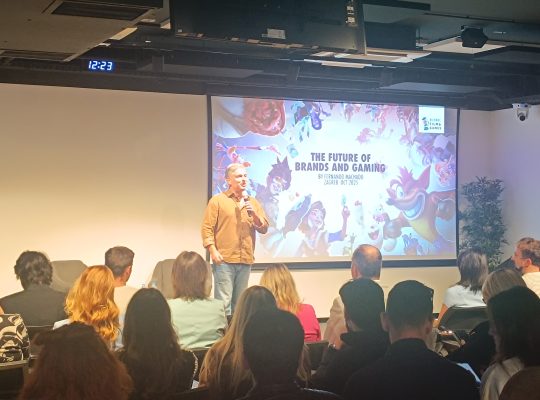A recent panel discussion during Blend: Film & Games conference brought together three video game composers and sound designers. Veteran host Damjan Mravunac (26 years), senior Nikola Nikita Jeremić (11 years), and junior Matija Malatestinić (5 years) discussed how the industry has transformed, emphasizing that modern success relies less on raw talent and more on professionalism and adaptability.
For those who don’t know, Jeremić is famous for his work on games like Aliens: Dark Descent, Warhammer 40k, Destiny 2, and Cyberpunk 2077. Malatestinić is currently a sound designer at Gamepires. Meanwhile, Mravunac has been with Croteam from the start, working on titles such as Serious Sam and Talos Principle.
From Basement Bands to Bungie
All three panelists initially sought careers in bands, but quickly realized the game industry offered a more practical creative outlet. Nikita’s shift was triggered at age 12 upon hearing the main theme for Halo: Combat Evolved, which fused his love of music and games. His career trajectory was later defined by pure chance: after meeting Halo composer Martin O’Donnell at a conference, a photo on Facebook caught the eye of O’Donnell’s collaborator, Michael Salvatori.
This led to a direct job offer to work on Destiny 2. Nikola accepted the life-changing opportunity. He later moved on to work exclusively on the Warhammer 40k franchise since 2017. Similarly, Damjan and Matija found that composing for a video game friend was far more efficient than managing bandmates, with Damjan humorously noting that a composer’s “hidden talent” is the need to play all the instruments themselves.
The Workflow Revolution
The technological shift from the ’90s to today has fundamentally altered the composer’s daily life. Damjan recalled starting his career with limited Trackers on diskettes, where constraints were the mother of invention. Today, the problem is abundance. Damjan’s studio holds 24 terabytes of storage, much of it dedicated to virtual instruments, creating a risk of “paralysis of creativity.”
Nikita’s solution to managing this digital glut is the master template. His Cubase project, containing 4,500 single instruments, took five months to design but opens in a mere 15 seconds because the instruments are initially “disabled.” This professional setup ensures that the vast majority of his time is spent on pure composing and arranging, with his final mix and master often taking less than 15 minutes. He jokingly stated that if his house were on fire, his computer would be the first and only thing he’d save.
When starting a new piece, the composers rely on structured processes: Nikola always starts with the melody at the piano, following the philosophy to “don’t overstay your welcome” by keeping arrangements dynamic. Damjan and Matija prefer to start with the musical climax (the busiest section) and work backward, stripping layers away to create a natural buildup.
The Non-Negotiable Art of Professionalism
A core lesson for success, according to Nikola, is the necessity of learning to swallow your ego. He compares the composer’s job to that of a construction worker: the client is the investor who dictates the non-negotiable specifications. If an audio director tells the composer “I don’t want violins here”, the only acceptable answer is to immediately remove them, rather than arguing artistic necessity. The composer’s music must serve the game’s narrative.
This need to serve the client also applies to the integration of sound effects. Matija has adopted AI tools like 11labs to generate “benign” sounds like footsteps from text prompts, saving time on repetitive tasks, while Nikola uses Boom Library’s Soundweaver to quickly generate variations of complex sound effects.
Damjan noted that while dealing with feedback is never easy, it’s a necessary process that often forces the composer out of their comfort zone. All three joked about sometimes “faking” minor changes (like bypassing a compressor instead of actually adjusting it) when client notes were misguided, but stressed that such situations are riskier when dealing with experienced audio directors.
The panelists unanimously agreed that the single most important characteristic for success is punctuality and professionalism. Nikola argued that the industry is saturated with talented composers, but clients consistently choose those who are reliable, responsible, and easy to work with. Damjan stressed the need to be a “Swiss Army knife” capable of handling different styles. Matija offered a practical strategy for delivery: always tell the client you need twice the time you actually require.











